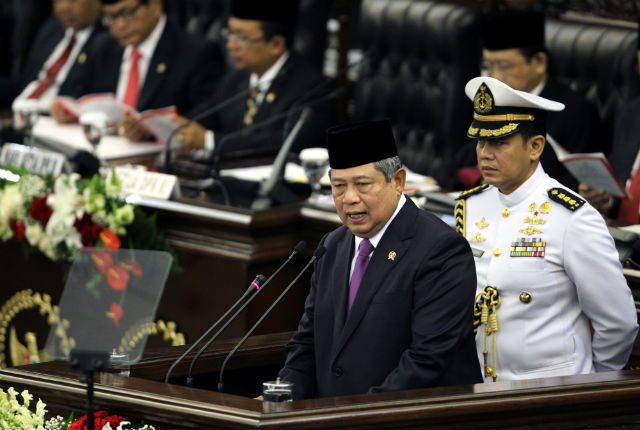SUMMARY
This is AI generated summarization, which may have errors. For context, always refer to the full article.

SYDNEY, Australia – Indonesia’s outgoing President Susilo Bambang Yudhoyono said Tuesday, August 26, he leaves office with a sense of satisfaction after strengthening democracy and the economy during a decade in power.
The former general stands down in October when Joko Widodo, the reform-minded governor of Jakarta who won July’s presidential polls, takes the reins of Southeast Asia’s top economy.
In an interview with The Australian newspaper, Yudhoyono admitted there was more work to be done, but said he had accomplished much.
“I leave my office with a sense of satisfaction that I have tried to do my best to serve the nation, and that at the end of my 10 years in office Indonesia is a stronger nation, a stronger democracy and a stronger economy,” he said.
Yudhoyono took on a nation suffering widespread graft, an insurgency in Aceh province and bombings by the Jemaah Islamiyah network when he was elected in Indonesia’s first direct presidential poll in 2004.
“We had many challenges but, one by one, we fixed our problems,” he said.
“We resolved the longstanding separatist conflict in Aceh. We stabilized the situation in Papua. We survived the tsunami crisis (of 2004) and many other natural disasters.
“We fought corruption hard, not always successfully. We neutralized and disrupted terrorist groups. We pursued a more active international engagement in a turbulent world,” he added.
Yudhoyono said Indonesia, where around half of the mostly Muslim population of 250 million are poor, had also weathered the global financial crisis and completed direct elections for all local leaders.
Economic growth had been healthy, averaging 5.9% during the period of 2009 to 2013, he said.
And although it had fallen to 5.2% in the first part of 2014, Indonesia was still experiencing higher economic growth than many other nations.
“In fact, in the G20, Indonesia has the second highest growth after China,” he said, adding that he expected growth to reach 6.0% or more within two years.
The president said that while he had made the unpopular decision to increase the price of petrol last year, and this year hiked electricity and gas, costly fuel subsidies had needed to be adjusted.
“My hope is that the new government will give the subsidy to the poor. We should not give the subsidy to the commodities but to the people who need it: the poor,” he said. – Rappler.com
Add a comment
How does this make you feel?
There are no comments yet. Add your comment to start the conversation.